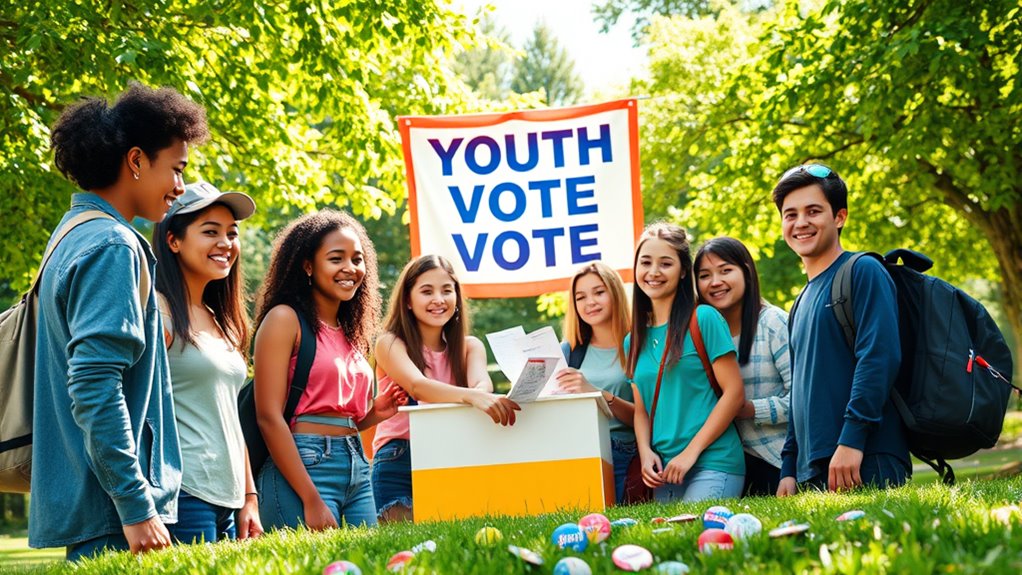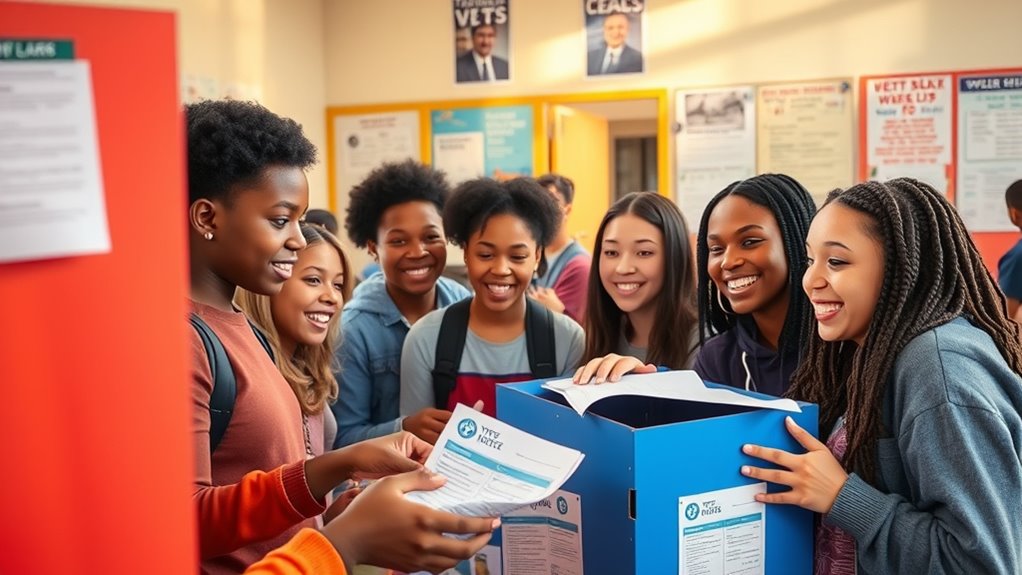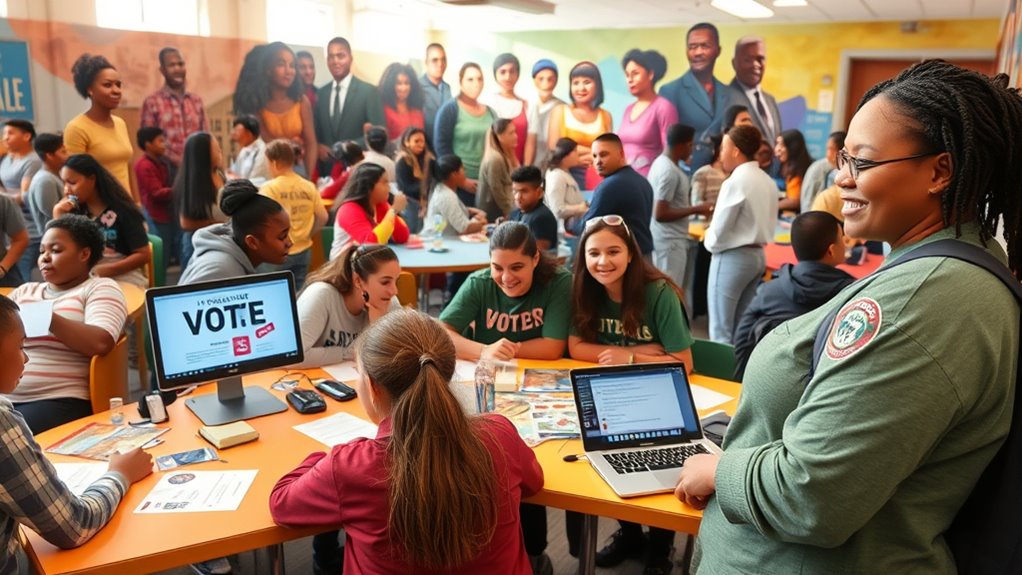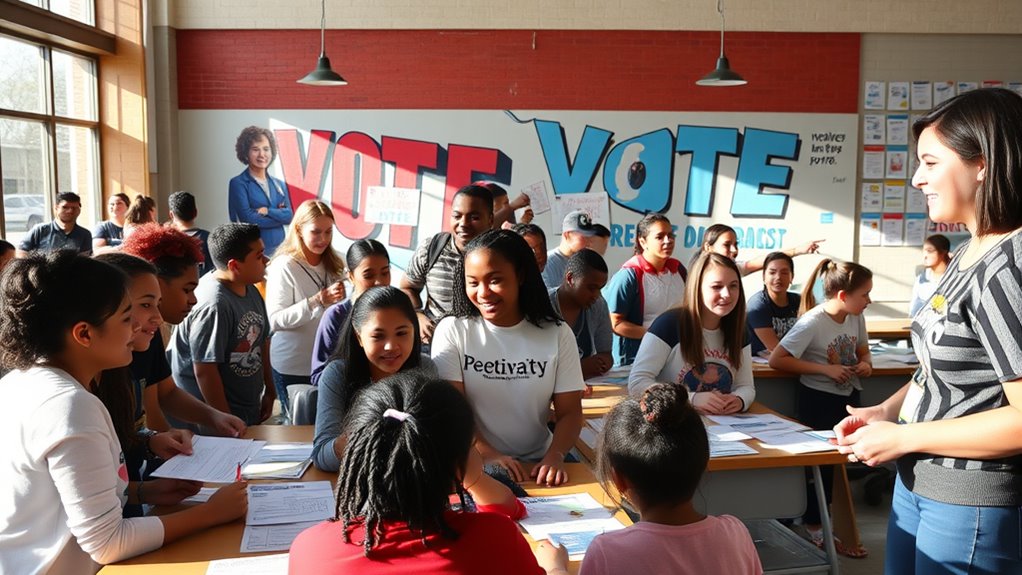Voting and civic engagement are essential in preparing you for adulthood. They empower you with the knowledge and skills to participate in democracy actively. Understanding your voting rights and processes builds confidence. However, barriers like restrictive laws and lack of civic education can hinder your involvement. Engaging with social media and community initiatives can enhance your motivation to vote. There are many innovative strategies available to support and inspire your participation in civic life.
Key Takeaways
- Integrating civic education in schools equips teens with knowledge about voting rights and processes, empowering them to participate confidently in democracy.
- Mock elections and voter pre-registration initiatives help develop voting habits and ease the transition to active civic engagement when eligible.
- Social media serves as a vital tool for informing teens about elections, mobilizing them to engage in discussions and share experiences with peers.
- Youth-led initiatives encourage leadership roles among teens, fostering a sense of ownership and responsibility towards civic duties and community involvement.
- Building supportive relationships and community connections enhances motivation for civic participation, reinforcing the importance of youth voices in shaping democracy.
teen voter registration kit
As an affiliate, we earn on qualifying purchases.
As an affiliate, we earn on qualifying purchases.
The Importance of Youth Participation in Elections

While you might think that your vote doesn’t matter, youth participation in elections is essential for shaping the future.
Historically, youth voter turnout has lagged behind other age groups, but recent trends show promise. In the 2022 midterm elections, about 23% of young people voted, a decline from 28% in 2018, yet still higher than in previous years. Youth turnout has remained above 20% in midterms since 2018, indicating increased electoral participation.
States with voter-friendly policies, like Michigan and Minnesota, see greater youth engagement. When young people feel their votes can influence outcomes, they’re more likely to participate.
This engagement not only impacts election results but also strengthens democracy, leading to a more inclusive society. By voting, you can drive change and guarantee that your voice is heard in shaping the future.

PragerU: Celebrate America – Race to The White House Board Game, USA Trivia Game, America’s 250th Anniversary Edition, Families & Kids 8+, 2+ Players, Made in America
EDUCATIONAL TRIVIA GAME: Test your knowledge with over 200 questions covering U.S. history, civics, geography, innovation, and culture,…
As an affiliate, we earn on qualifying purchases.
As an affiliate, we earn on qualifying purchases.
Understanding Voting Rights and Processes

Understanding your voting rights and the processes involved is essential for making your voice heard in elections. Your voting rights are protected by constitutional amendments, including the 15th, 19th, 24th, and 26th, ensuring everyone has a fair chance to vote. The Voting Rights Act of 1965 combats discriminatory practices, while federal law requires proof of citizenship for voting. Keep in mind that voter ID laws and registration procedures vary by state, so check your local requirements. Additionally, the Voting Rights Act aimed to eliminate barriers to voting for minorities and continues to play a crucial role in protecting these rights. Election Day is uniform for federal elections, but registration deadlines can differ. Always verify your eligibility, as databases and ID checks are common. Understanding these rights and processes empowers you to participate confidently in democracy.
mock election kit for teens
As an affiliate, we earn on qualifying purchases.
As an affiliate, we earn on qualifying purchases.
Addressing Barriers to Civic Engagement

To engage effectively in civic life, it’s crucial to recognize and address the barriers that often hinder young people’s participation. Restrictive voting laws and societal misconceptions about youths’ contributions can discourage you from getting involved.
Limited representation in leadership diminishes your motivation, while a lack of civic education leaves you feeling disengaged. Understanding the importance of civic education is essential for fostering informed participation, further alienating young people from the civic process. Socioeconomic factors, like income disparity, create additional hurdles, and scheduling conflicts with school or work can prevent participation in civic activities.
Additionally, low awareness of opportunities and perceptions of adultism can further stifle your involvement. By acknowledging these barriers, we can work toward creating a more inclusive environment that encourages your active engagement in civic matters and empowers you to make a difference.

Handbook of Research on Civic Engagement in Youth
As an affiliate, we earn on qualifying purchases.
As an affiliate, we earn on qualifying purchases.
Strategies for Educating Teens on Voting

Educating teens about voting isn’t just about informing them; it’s about inspiring them to take action. Start by integrating civics into the curriculum, helping you develop critical thinking and communication skills.
Engage in mock elections to build voting habits early on. Facilitate voter pre-registration where allowed, making it easier for you to participate when the time comes. Schools can foster a lifelong voting habit among students, ensuring they carry these values into adulthood.
Organize field trips to public resources and discussions about community involvement to connect you with civic life. Leverage digital platforms and social media campaigns to spark your interest in political issues.
Finally, encourage volunteer opportunities in campaigns to give you firsthand experience. These strategies create a foundation for informed, engaged citizens ready to make their voices heard.
The Role of Community in Fostering Civic Involvement

While community organizations play an essential role in fostering civic involvement among teens, they also create vibrant spaces where young people can connect and grow.
These organizations offer volunteering opportunities and skill-building programs that empower you to understand community needs. Engaging with diverse groups helps bridge societal divides, promoting inclusivity and tolerance.
Supportive community environments amplify your sense of belonging and social responsibility, encouraging active participation. Effective youth services workers connect you with civic engagement opportunities, enhancing your skills as a changemaker.
Additionally, access to resources like education and internet is vital, especially for those facing systemic barriers. By participating in these community initiatives, you not only contribute to society but also develop essential life skills for your future.
The Impact of Social Media on Youth Voter Turnout

Community organizations provide the foundation for civic involvement, but social media has emerged as a powerful tool in shaping youth voter turnout. Nearly half of young adults aged 18 to 24 use platforms like Facebook and Instagram to gather information about elections. This online engagement surged during the Covid-19 pandemic, making platforms like TikTok essential for reaching first-time voters. While social media alone mightn’t boost turnout, it effectively mobilizes youth by making political information accessible and relatable. When you see your peers discussing issues that matter to you, it motivates participation. Moreover, the rise of social justice movements has created a more engaged and politically aware generation of young voters. Engaging in mindfulness practices can help youth critically evaluate the information they encounter online and make informed decisions when voting. Additionally, the integration of AI in education supports the development of critical thinking skills, which are vital for discerning reliable information. AI-driven data analytics can also help young voters understand trends in voter turnout and the issues most relevant to their peers.
However, challenges like biased information and the digital divide persist, reminding us that while social media can inspire, it’s vital to remain informed and critical. Additionally, AI technologies improve threat detection in cybersecurity, ensuring that the information shared on these platforms remains secure and trustworthy.
Future Directions for Engaging Young Voters

As the landscape of civic engagement continues to evolve, finding innovative ways to connect with young voters is essential for fostering a more active electorate.
First, integrating extensive civic education in K-12 schools can greatly boost voting likelihood by up to 40%. It’s vital to address local issues that resonate with youth, like education and housing, to foster a sense of investment in election outcomes. Additionally, promoting self-love can empower young individuals to feel more confident in voicing their opinions and participating in the democratic process.
Encouraging peer-to-peer outreach and community involvement can motivate young voters to participate. Utilizing strategies like automatic voter registration and issue-focused advertising through platforms like Connected TV will help engage diverse young voters.
Finally, empowering youth-led initiatives and leadership opportunities cultivates ongoing civic engagement, ensuring a representative democracy that includes voices from all backgrounds. Celebrating the importance of relationships helps create a supportive environment for young voters to feel connected and motivated to engage in civic duties.
Frequently Asked Questions
What Are the Age Requirements for Voting in Different States?
In the U.S., the national voting age is 18, thanks to the Twenty-sixth Amendment.
However, some states let you preregister at 16, like California and Colorado. If you’re 17 and will turn 18 before the general election, states like Maine allow you to vote in primaries.
Others, such as Georgia and Iowa, let you preregister at 17.5.
It’s important to check your state’s specific rules to stay informed!
How Can Teens Get Involved in Local Government Initiatives?
Getting involved in local government initiatives is like planting a seed in your community garden; with care, it can flourish.
You can join youth councils to voice your ideas and concerns directly to officials. Participate in workshops and educational programs at your school that focus on local governance.
Don’t forget to leverage social media to engage with local issues and connect with other young citizens. Your input can make a real difference!
What Resources Are Available for First-Time Voters?
If you’re a first-time voter, there are plenty of resources to help you navigate the process.
Check out online registration platforms specific to your state for a quick sign-up. Organizations like RocktheVote offer guidance, while vote.gov provides centralized info.
Don’t forget mail registration forms if online options aren’t available.
For your voting plan, visit VOTE411 for candidate guides and polling place locators, ensuring you’re well-prepared for Election Day.
Are There Scholarships for Students Involved in Civic Engagement?
You might think scholarships for civic engagement are hard to find, but they’re actually plentiful!
Programs like Emory & Henry College’s Bonner Program and the Civic Leader Scholars Program offer financial support for students who are passionate about making a difference.
These scholarships not only reward your commitment but also connect you to valuable networks, helping you grow as a leader.
How Can Teens Advocate for Issues They Care About?
You can advocate for issues you care about by using social media platforms like Instagram and TikTok to raise awareness.
Join online campaigns, share informative posts, and connect with others who share your passions.
Educate yourself on the topics by attending workshops or reading relevant materials.
Don’t hesitate to volunteer in your community, as real-world engagement builds your understanding and influence.
Conclusion
Involving teens in the voting process is essential for a vibrant democracy. Did you know that about 50% of eligible voters aged 18-29 didn’t participate in the last election? This statistic highlights the urgent need for better education and community support to empower young voters. By breaking down barriers and fostering civic engagement, you can help shape a generation that values participation. Together, let’s inspire teens to embrace their rights and responsibilities as active citizens.









